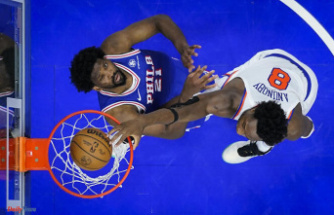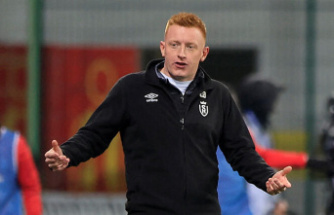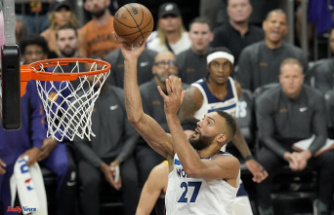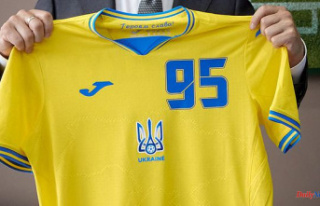This is a highly anticipated event. Already postponed by a year due to the Covid-19 pandemic, the Euro football championship opens on Friday and will be accompanied until July 11 by a host of health precautions, which vary from country to country. another and which concern the players as well as the spectators. The tournament is spread across eleven countries, with thousands of fans traveling across Europe.
What raise some concerns about the risk of contamination. But as epidemiologist Antoine Flahault told AFP, “the time has come for the epidemic to decline in a large part of Europe. So the risk seems very limited to me for the vast majority of Europeans”. The director of the Institute of Global Health at the University of Geneva, however, distinguishes "the United Kingdom and Portugal, countries which are experiencing a phase of exponential epidemic growth". Two matches of the first round will take place in the United Kingdom (in London and Glasgow). In addition, three British teams (England, Scotland, Wales) and Portugal participate in the Euro. Update on the measures taken to ensure that the Covid-19 is offside.
Players, management, officials and media have been used for almost a year to the "bubbles" which allowed the resumption of competitions in mid-2020: they will have to undergo regular Covid-19 tests, spaced out by a maximum of four days and punctuated by their movements in the eleven host countries, keep their distance and avoid visits and escapades. This isolation may affect group life, already a key parameter during long competitions.
The teams will therefore live under the threat of withdrawals linked to contamination – such as that of Dutch goalkeeper Jasper Cillessen for the entire tournament, or those of Spaniard Sergio Busquets and Swedes Dejan Kulusevski and Mattias Svanberg for Sweden-Spain on Monday.
If there was never any question of imposing the vaccination of the participants, some of the delegations will have already benefited from one or two injections, without it being possible to estimate in what proportions. The management of the Blues, for example, was vaccinated before the end of May, but nothing was organized for the players, left to their "personal choice". Kylian Mbappé received his first dose on May 25. The Spanish team received the green light to be vaccinated on Wednesday after the positive case of Sergio Busquets.
The big challenge for UEFA was to get each host city to welcome the public, a requirement linked to the expected revenue from the ticket office but also to the desire to celebrate the first major international tournament since the 2018 World Cup without the gloom behind closed doors. “Each site, each city, each country has defined its formula”, explains to AFP Daniel Koch, former “Mr Covid” of Switzerland who has become UEFA health adviser to organize this return of spectators.
Budapest has pledged to fill its stadium – around 68,000 spectators – on the condition of full vaccination for Hungarians, and vaccination or negative test for foreigners. Conversely, Munich will only admit 22% of the public to its legendary Allianz Arena, i.e. 14,000 people at most.
For its part, Denmark will allow 25,000 spectators during the four matches which will be played in Copenhagen, against 16,000 so far. Due to lack of time, this measure cannot however be implemented from the first meeting, Denmark-Finland, on Saturday, warned the federation.
Access to the enclosures will be staggered everywhere to avoid queues, with a thirty-minute entry slot for each ticket holder, and spectator safety will be based on distancing and the presence of "800 hydroalcoholic solution dispensers on average" per stadium, according to UEFA.
The risk of contamination in the stadiums seems in any case limited: being outside in fact favors the disappearance of aerosols. However, these invisible clouds of particles that we emit when we speak or breathe are largely responsible for contamination. "With the mask, there should be no problem, even if the stadiums are places protected from the wind", judges physicist Bruno Andreotti, specialist in aerosol transmission.
For supporters who want to follow their team, the major obstacle will be at the borders, while only Azerbaijan, Hungary and Russia have so far implemented special procedures for ticket holders, with exemptions from quarantine. Romania is considering doing the same for visitors staying less than three days there and presenting a negative test for Covid-19.
But restrictions are in force everywhere else and in particular in the United Kingdom, which is currently facing a surge in the Delta variant which has appeared in India, and which is to host the semi-finals and the final of the competition in London.
One of the health unknowns of the tournament is the impact that spontaneous or organized gatherings outside stadiums, across the whole continent, will have on contamination to follow matches with friends, neighbors or family. "Fans have a legitimate need to express their support and joy, but it's better to have something organized rather than wild and uncontrollable parties," said Daniel Koch.
Fan zones are thus planned in Russia, Poland, London, Glasgow, Budapest, Rome, Copenhagen, Vienna and in the largest stadium in kyiv, with varied gauges and subject to reservation, proof of vaccination or negative Covid test. Nothing like this is programmed in Seville, Bucharest and Sweden, when Munich has given up on this type of space and Brussels prefers to avoid it before a possible relaxation on June 30. On the French side, where fan zones are authorized if spectators remain seated and masked, nothing has yet been announced outside of Paris. Finally, many bars and restaurants should offer giant screens but will have to deal with capacity limits on the terrace or inside, the maximum number of people per table as well as possible curfews.
The risk of contamination in fan zones and bars exists. The Euro matches, "it's a bit the same as the ski slopes: it's not the activity itself that is problematic, but all the extras", indeed notes Mircea Sofonea , lecturer in epidemiology at the University of Montpellier. "The times most at risk are when supporters meet over a drink in closed and poorly ventilated spaces (bars or restaurants, refreshments, etc.), while barrier gestures are relaxed", underlines Antoine Flahault.
Indoors, "population density can be a problem", continues epidemiologist Mircea Sofonea, according to whom this can potentially promote "superpropagation events" of the virus. "As soon as we are outside, it is immediately better," adds Bruno Andreotti. However, even if it is much lower than indoors, the risk is not zero. "If people don't have a mask, shout and sing, the context is unfavorable, all the more so if there is very little wind", estimates Mircea Sofonea.












